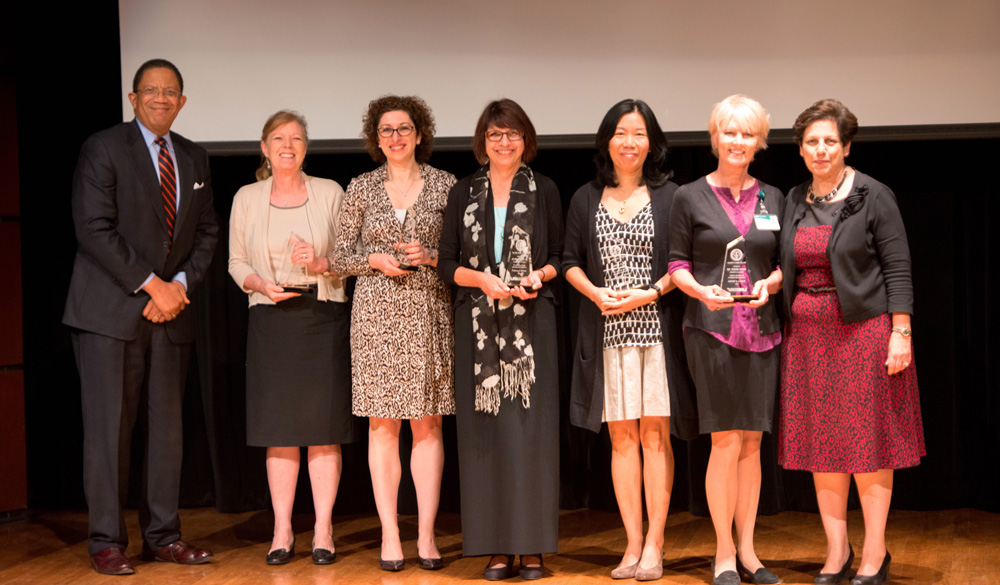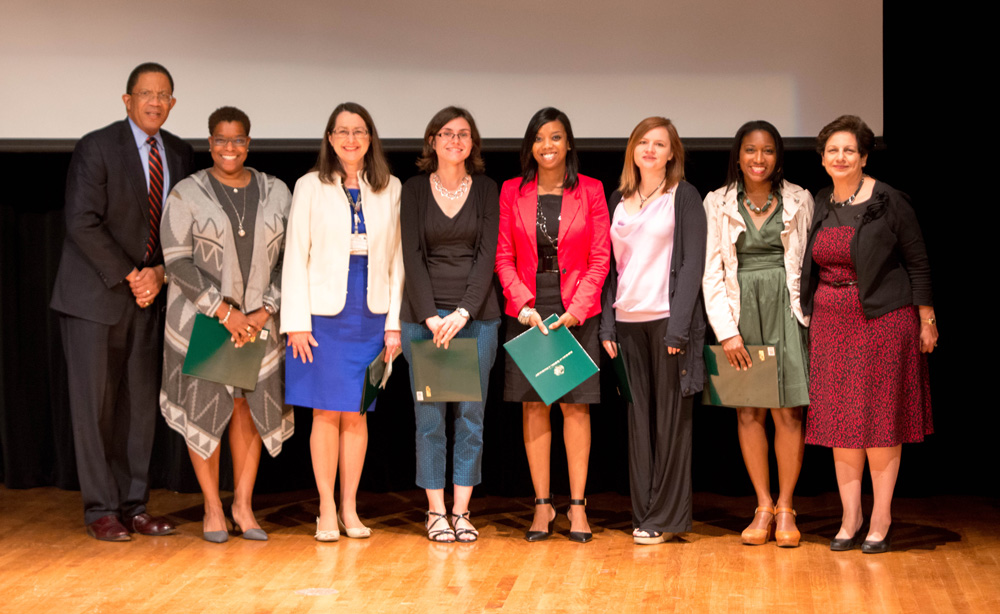 Women faculty in the School of Medicine promoted to the rank of professor in 2015 were honored at the Women in Medicine reception.In the words of pioneering doctor Elizabeth Blackwell, "if society will not admit of woman's free development, society must be remodeled."
Women faculty in the School of Medicine promoted to the rank of professor in 2015 were honored at the Women in Medicine reception.In the words of pioneering doctor Elizabeth Blackwell, "if society will not admit of woman's free development, society must be remodeled."Five women in the process of remodeling society were recently honored for their promotion to the rank of professor in the UAB School of Medicine with a special lecture and reception at the Alys Stephens Performing Arts Center. The women honored were:
Virginia Wadley Bradley, Ph.D., professor of Medicine in the Division of Gerontology, Geriatrics and Palliative Care. She serves as director of the Dementia Care Research Program of the Comprehensive Center for Healthy Aging and associate director of the National Institute on Aging- funded Edward R. Roybal Center for Translational Research on Aging and Mobility at UAB. She is the primary investigator of an R01 award of nearly $2.3 million from the NIA, a grant that allows her team to conduct a five-year clinical trial in which they will evaluate a computer-based processing speed training program for persons diagnosed with mild cognitive impairment.
Yufeng Li, Ph.D., professor of Medicine in the Division of Preventive Medicine. She is the Biostatistics Core director for the SPORE in Breast Cancer multi-project grant to expand breast cancer research at UAB and the Comprehensive Cancer Center with an emphasis on translational research. She is a member of numerous professional organizations, including the International Society for Nutrition and Cancer, the American Association for Cancer Research and the American Statistical Association. She serves as a Journal Review Board Member for the Interdisciplinary Journal of Information, Knowledge, and Management and a statistical reviewer for the Annals of Surgical Oncology.
Avi Madan-Swain, Ph.D., professor of Pediatrics in the Division of Pediatric Hematology/Oncology. She is also the director of the Hope and Cope psychosocial program at Children's of Alabama. She is actively engaged in research focusing on neurocognitive functioning in survivors of childhood leukemia, brain tumor and stem cell transplant; school reentry for chronically ill youth, as well as individual and familial adaptation and coping and quality of life issues.
Salpy Pamboukian, M.D., professor of Medicine and section chief of Advanced Heart Failure, Transplantation and Pulmonary Vascular Disease in the Division of Cardiovascular Disease. She is a fellow of the American College of Cardiology, and is certified by the United Network of Organ Sharing as a heart transplant cardiologist. She is medical director of the Mechanical Circulatory Support Device Program at UAB and co-section head of the Section of Advanced Heart Failure, Cardiac Transplant, Mechanical Circulatory Support and Pulmonascular Disease.
Anne Theibert, Ph.D., professor of Neurobiology and adjunct professor of Cell Biology and Physiology and Biophysics. Her research focuses on investigating the intracellular targets for several of the phosphoinositide system second messengers in the nervous system; she has been published extensively.
Featured speaker was Gail H. Cassell, Ph.D., DSc (hon), whose illustrious career includes service on advisory boards for the National Institutes of Health, Centers for Disease Control and Prevention and Food and Drug Administration science board, as well as her current positions as senior lecturer in the Department of Global Health and Social Medicine at Harvard Medical School and senior scientist in the Division of Health Equity, Brigham and Women's Hospital. Cassell was chair of the Department of Microbiology at the UAB School of Medicine for a decade and is co-chair of the school’s Board of Visitors.
She encouraged the women faculty who had been promoted to continue to challenge themselves, to network with one another, and to both continue to seek out mentors and provide mentoring. "Networking isn't always easy," she said, "but it is crucial. And it's especially important for women."
The burden, Cassell said, is “on all of us,” to identify the causes of gendered disparities in academic medicine, and to seek out strategies to deal with them.
This task can be challenging for women in academic medicine, however, as Cassell illustrated in referencing a recent article in The Journal of the American Medical Association that described a comprehensive study of faculty in academic medicine. The study showed that while half of all new doctors are women, the proportion of women who are full professors has not changed in 30 years.
"We still don't have enough diversity in biomedical sciences, and women in particular are underrepresented," Cassell said. "There is a feeling that the problem is largely solved or on its way to being solved, but in fact it is not."
 School of Medicine women faculty promoted to associate professor in 2015 were also recognized at the Women in Medicine reception.After the lecture, each of the women promoted to professor were awarded a plaque by Mona Fouad, M.D., MPH, senior associate dean for Diversity and Inclusion.
School of Medicine women faculty promoted to associate professor in 2015 were also recognized at the Women in Medicine reception.After the lecture, each of the women promoted to professor were awarded a plaque by Mona Fouad, M.D., MPH, senior associate dean for Diversity and Inclusion.Fourteen women promoted to the rank of associate professor this year were acknowledged and honored with certificates. These women were: Jamie Cannon, M.D., Division of Gastrointestinal Surgery; Maria Danila, M.D., MSPH, Division of Clinical Immunology and Rheumatology; Jennifer De Los Santos, M.D., Department of Radiation Oncology; Karen Gamble, Ph.D., Department of Psychiatry and Behavioral Neurobiology; Keneshia Kirksey, M.D., Department of Physical Medicine and Rehabilitation; Michele Kong, M.D., Department of Pediatrics; Farah Lubin, Ph.D., Department of Neurobiology; Jeanine Maclin, M.D., MPH, Department of Pediatrics; Laurie Marzullo, M.D., Department of Pediatrics; Melissa Peters, M.D., Department of Pediatrics; Katherine Romp, M.D., Division of General Internal Medicine; Nina Terry, M.D., J.D., Department of Radiology; Tracey Wilson, M.D., Department of Urology; and Vinita Yalamanchili, M.D., Department of Psychiatry and Behavioral Neurobiology.